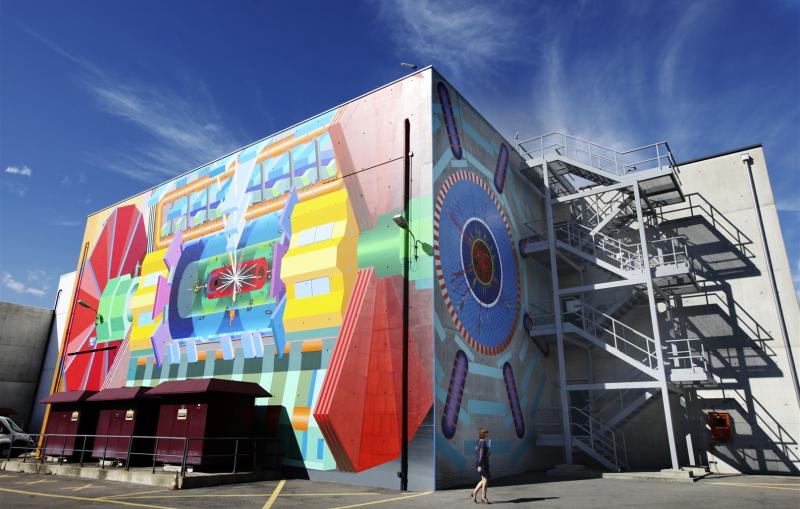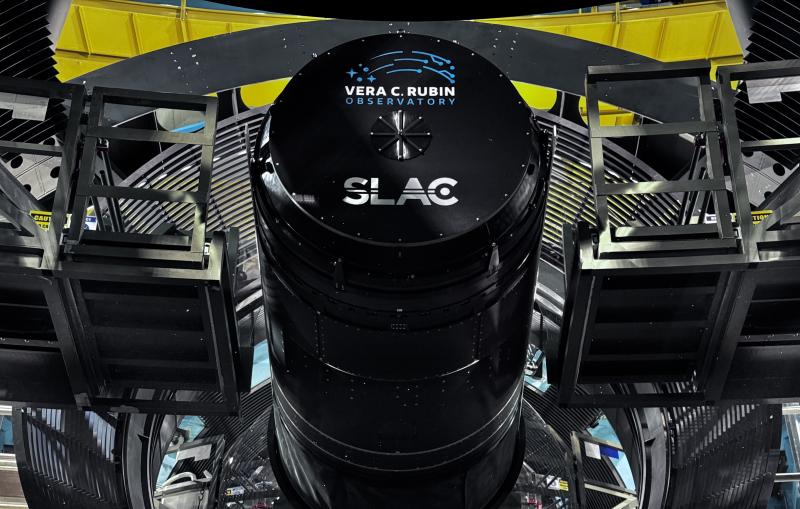Standard model of the Universe withstands most precise test by Dark Energy Survey
SLAC and Stanford astrophysicists made crucial contributions to the galaxy survey, showing that the universe clumps and expands as predicted by our best cosmological models.
By Manuel Gnida
Astrophysicists have a fairly accurate understanding of how the universe ages: That’s the conclusion of new results from the Dark Energy Survey (DES), a large international science collaboration, including researchers from the Department of Energy’s SLAC National Accelerator Laboratory, that put models of cosmic structure formation and evolution to the most precise test yet.
The survey’s researchers analyzed light from 26 million galaxies to study how structures in the universe have changed over the past 7 billion years – half the age of the universe. The data were taken with the DECam, a 570-megapixel camera attached to the 4-meter Victor M. Blanco Telescope at the Cerro Tololo Inter-American Observatory in Chile.


Previously, the most precise test of cosmological models came from measurements with the European Space Agency’s Planck satellite of what is known as the cosmic microwave background (CMB) – a faint glow in the sky emitted 380,000 years after the Big Bang.
“While Planck looked at the structure of the very early universe, DES has measured structures that evolved much later,” said Daniel Gruen, a NASA Einstein postdoctoral fellow at the Kavli Institute for Particle Astrophysics and Cosmology (KIPAC), a joint institute of Stanford University and SLAC. “The growth of these structures from the early ages of the universe until today agrees with what our models predict, showing that we can describe cosmic evolution very well.”
Gruen will present the results, which are based on the first year of data from the 5-year-long survey, today at the 2017 Division of Particles and Fields meeting of the American Physical Society at the DOE’s Fermi National Accelerator Laboratory.
KIPAC faculty member Risa Wechsler, a founding member of DES, said, “For the first time, the precision of key cosmological parameters coming out of a galaxy survey is comparable to the ones derived from measurements of the cosmic microwave background. This allows us to test our models independently and combine both approaches to obtain parameter values with unprecedented precision.”
Largest Map of Mass Distribution
The standard model of cosmology, called Lambda-CDM, includes two key ingredients. Cold dark matter (CDM), an invisible form of matter that is five times more prevalent than regular matter, clumps together and is at the heart of the formation of structures such as galaxies and galaxy clusters. Lambda, the cosmological constant, describes the accelerated expansion of the universe, driven by an unknown force referred to as dark energy.
Astrophysicists need precise tests of the model because its ingredients are not completely certain. Dark matter has never been directly detected. Dark energy is even more mysterious, and it’s not known whether it actually is a constant or changes over time.
DES has now succeeded in carrying out such a precision test. The scientists used the fact that images of faraway galaxies get slightly distorted by the gravity of galaxies in the foreground – an effect known as weak gravitational lensing. This analysis led to the largest map ever constructed for the distribution of mass – both regular and dark matter – in the universe, as well as its evolution over time.
“Within an error bar of less than 5 percent, the combined Planck and DES results are consistent with Lambda-CDM,” Wechsler said. “This also means that, so far, we don’t need anything but a constant form of dark energy to describe the expansion history of the universe.”

Key Contributions from KIPAC
In addition to Gruen, who led the weak lensing working group, and Wechsler, whose group provided realistic simulations of the survey critical to testing several aspects of the cosmological analysis, a large number of KIPAC scientists, postdoctoral fellows, graduate students and alumni have made crucial contributions to DES – from building the instrument to developing theory and simulations and analyzing the data.
Postdoctoral fellow Elisabeth Krause, for example, leads the DES theory and combined probes working group. In that role, she led the charge in developing theoretical models that match the experimental precision obtained with the DES data. This involved writing computer codes that calculate what weak gravitational lensing should look like for a given model.
“Different people develop slightly different codes that are meant to do the same thing,” she said. “I helped bring code developers together to cross-check their results and to make sure that we get the most precise theory codes possible.”
Another key to the creation of the mass distribution map was to accurately determine the distances to the observed galaxies – information that is usually derived from independent surveys that analyze the properties of light coming from those objects or from exploding stars.
“We’ve shown that we can use the color of certain red galaxies – red is the color they would have if you were right in front of them – to determine how far they are away,” said SLAC staff scientist Eli Rykoff, who had a leading role in this part of the analysis. “It turns out that if we map where these red galaxies are in the sky, we can use them to calibrate the distances of the lenses and background galaxies used in the study.”

Dark matter clumps close-up
Clumps and filaments of dark matter (black areas) serve as the scaffolding for the formation of cosmic structures made of regular matter (bright areas), including stars, galaxies and galaxy clusters.
Simulation: Y-Y. Mao, R. Wechsler, KIPAC/Stanford/SLAC; Visualization: R. Kaehler, KIPAC/SLAC
Toward Even Deeper Cosmic Insights
In the near future, more DES data will allow astrophysicists to test their cosmological models with even more precision. The analysis of data collected during the first three years of the survey will begin soon, and the fifth year of observations will also soon be underway.
With even better data, the researchers said, we might find out if the relatively simple Lambda-CDM model needs to be modified.
“The methods developed for DES and the experience its researchers are gaining along the way will also benefit the natural flow of ever-evolving experiments,” said KIPAC faculty member David Burke, head of SLAC’s DES group.
Both will prepare scientists for future surveys, including ones with the Large Synoptic Survey Telescope (LSST). With its 3.2-gigapixel camera, which is under construction at SLAC, astrophysicists will be able to explore the depths of our universe like never before.
DES is a collaboration of more than 400 scientists from 26 institutions in seven countries. Part of the funding has been provided by the U.S. Department of Energy Office of Science. A full list of collaborating institutions can be found at www.darkenergysurvey.org/collaboration.

3D Dark Matter Simulation
This movie shows a simulation of the 3-D distribution of dark matter. Its projection onto the sky corresponds to the 2-D map measured by DES.
Joe DeRose/Risa Wechsler/Ralf Kaehler/Stanford University/SLAC National Accelerator Laboratory
List of Publications: www.darkenergysurvey.org/des-year-1-cosmology-results-papers
About SLAC
SLAC National Accelerator Laboratory explores how the universe works at the biggest, smallest and fastest scales and invents powerful tools used by researchers around the globe. As world leaders in ultrafast science and bold explorers of the physics of the universe, we forge new ground in understanding our origins and building a healthier and more sustainable future. Our discovery and innovation help develop new materials and chemical processes and open unprecedented views of the cosmos and life’s most delicate machinery. Building on more than 60 years of visionary research, we help shape the future by advancing areas such as quantum technology, scientific computing and the development of next-generation accelerators.
SLAC is operated by Stanford University for the U.S. Department of Energy’s Office of Science. The Office of Science is the single largest supporter of basic research in the physical sciences in the United States and is working to address some of the most pressing challenges of our time.





